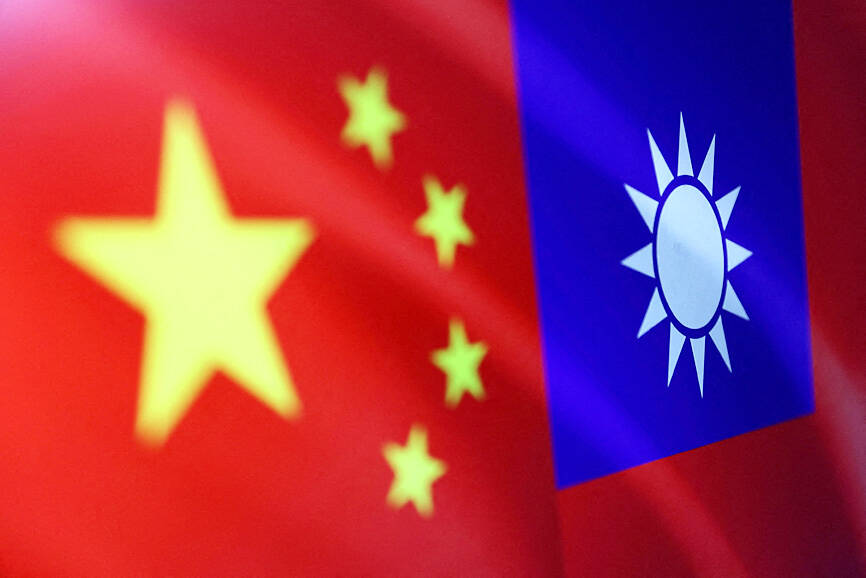Anchored in the heart of colonial San Salvador, a towering and expansive library was this week inaugurated by Salvadoran President Nayib Bukele, the latest sign of China’s growing influence across Central America.
With the Chinese ambassador at his side, Bukele toured the seven-story building, erected at a cost of US$54 million paid for by China.
The building sprawls over 2.4 hectares, and contains gamer and robotics areas, interactive digital screens, and a digital library and shelves containing 360,000 books, the government said on Tuesday last week.

Photo: Reuters
A day later, the son of Nicaraguan President Daniel Ortega, Laureano Ortega, inspected 250 Chinese-made buses and thanked Beijing for the “special relationship” he asserted was lifting the nation out of poverty.
“The new politics of the region has accelerated China’s influence and put distance between the US and Central America, from the leftist authoritarian Ortega regime to the right-wing authoritarian Bukele regime,” said Evan Ellis, a researcher at the US Army War College’s Strategic Studies Institute.
Since Costa Rica switched diplomatic relations from Taipei to Beijing in 2007, China has steadily gained ground in Central America, establishing relations with Panama (2017), El Salvador (2018), Nicaragua (2021) and most recently Honduras earlier this year.
“China’s efforts in Central America have mostly been driven by an interest in isolating Taiwan,” said Margaret Myers, a specialist in China and Latin America at the Inter-American Dialogue think tank.
In Central America, only Guatemala and Belize are among Taiwan’s 13 diplomatic allies.
“Central America is part of this isolation effort,” Salvadoran economist Cesar Villalona said.
Nicaragua on Thursday ratified a free-trade agreement with China, while El Salvador and Honduras are pursuing their own trade accords with Beijing.
However, commercial trade ties are heavily tilted in China’s favor.
In Costa Rica, for example, imports from China have reached US$3.35 billion, while its annual exports total only US$400 million, and El Salvador imports US$2.8 billion while exporting US$48 million, official trade figures showed.
“China is very far. Our productive capacity is poor and shipping costs and insurance rates make it hard to compete on cost. In Nicaragua, the deficit will grow” with the free-trade pact, said Enrique Saenz, a Nicaraguan economist living in exile in Costa Rica.
Although these economies are not important to China, they are along key trade routes.
Panama, crucial due to its cross-isthmus canal, has had Chinese companies involved in the construction of maritime terminals on the waterway, of which China is the world’s second largest client, after the US.
China’s largest banks have a presence in Panama’s financial center and dozens of Chinese companies offer goods in the Colon Free Zone (at the Caribbean terminus of the canal), former Panamanian vice minister of foreign affairs Luis Miguel Hincapie said.
Myers said that Central American countries “represent a notable market for Chinese tech exporters.”
Laureano Ortega, in whose country Chinese companies are planning road, airport and energy projects, spoke of a 5G technology plan after recently visiting the Shenzhen headquarters of telecommunications giant Huawei.
In addition to the library, China is to build a 50,000-seat soccer stadium in El Salvador, larger than the one it built in Costa Rica, as well as a shipping wharf on the Pacific coast, all at little or no cost.
Earlier this month, US President Joe Biden warned Costa Rica’s president and several other Latin American leaders gathered in Washington not to fall into a “debt trap” — a veiled reference to China.
“The trap is already in place,” Honduran Minister of the Presidency Rodolfo Pastor said, referring to his country’s huge debt with organizations and foreign banks.
Pastor said the relationship with the US over the past 40 years has not helped the region to “get out of poverty or trigger development.”
“We have to bet on something new,” Pastor said.

South Korean K-pop girl group Blackpink are to make Kaohsiung the first stop on their Asia tour when they perform at Kaohsiung National Stadium on Oct. 18 and 19, the event organizer said yesterday. The upcoming performances will also make Blackpink the first girl group ever to perform twice at the stadium. It will be the group’s third visit to Taiwan to stage a concert. The last time Blackpink held a concert in the city was in March 2023. Their first concert in Taiwan was on March 3, 2019, at NTSU Arena (Linkou Arena). The group’s 2022-2023 “Born Pink” tour set a

CPBL players, cheerleaders and officials pose at a news conference in Taipei yesterday announcing the upcoming All-Star Game. This year’s CPBL All-Star Weekend is to be held at the Taipei Dome on July 19 and 20.

The Taiwan High Court yesterday upheld a lower court’s decision that ruled in favor of former president Tsai Ing-wen (蔡英文) regarding the legitimacy of her doctoral degree. The issue surrounding Tsai’s academic credentials was raised by former political talk show host Dennis Peng (彭文正) in a Facebook post in June 2019, when Tsai was seeking re-election. Peng has repeatedly accused Tsai of never completing her doctoral dissertation to get a doctoral degree in law from the London School of Economics and Political Science (LSE) in 1984. He subsequently filed a declaratory action charging that

The Hualien Branch of the High Court today sentenced the main suspect in the 2021 fatal derailment of the Taroko Express to 12 years and six months in jail in the second trial of the suspect for his role in Taiwan’s deadliest train crash. Lee Yi-hsiang (李義祥), the driver of a crane truck that fell onto the tracks and which the the Taiwan Railways Administration's (TRA) train crashed into in an accident that killed 49 people and injured 200, was sentenced to seven years and 10 months in the first trial by the Hualien District Court in 2022. Hoa Van Hao, a